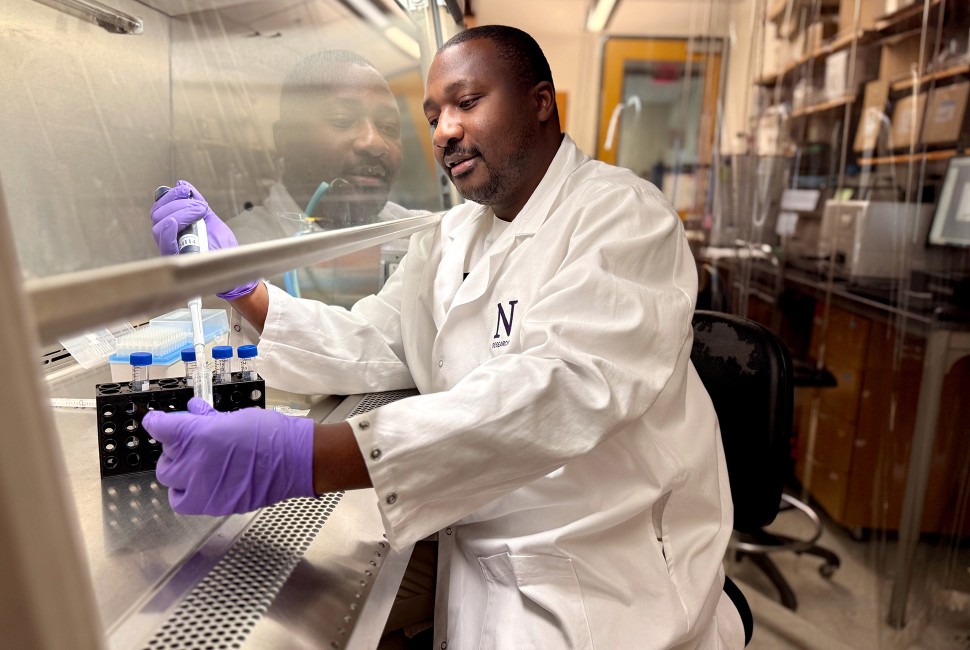Northwestern’s Center for Synthetic Biology (CSB) hosted George Peter Magoola as the inaugural recipient of the center’s new Research Experience for Africans (SynBrREA) Fellowship this past fall.
The pilot program was launched in December 2023 in collaboration with Synbio Africa, a Ugandan-based professional organization dedicated to building a healthy, safe and sustainable world through synthetic biology. The first fellow, Magoola, who is from the East African Republic of Uganda, joined Northwestern for a fall program of mentored, research-intensive activities and instruction in the rapidly growing field of synthetic biology, built upon successes with similarly structured summer programs at the undergraduate level.
Synthetic biology uses the fundamental molecules of life, including DNA, RNA and proteins, as building blocks to design new systems to solve crucial global challenges in human health, sustainability, materials and biomanufacturing. By combining concepts across disciplines, researchers can build with biology in much the same way an engineer creates a high-tech device, but instead of the program running on a computer, it does so within a biological system.
He provided context and personal stories that ... made us realize the impact one can have by working on those problems.”
Co-director of the Center for Synthetic Biology
“Having George as a visiting researcher in the CSB really brought a global perspective to our labs, with many discussions of the differences and similarities between biology research at Northwestern versus premier universities in Uganda,” said Danielle Tullman-Ercek, professor of chemical and biological engineering at Northwestern’s McCormick School of Engineering and co-director of the CSB.
“He also offered insights into pressing problems in Africa, e.g. cold chain supply issues, and a need for rapid and inexpensive diagnostics, that could be addressed with synthetic biology. We hear about these often in a more general sense on a list of important problems, but he provided context and personal stories that were inspiring and made us realize the impact one can have by working on those problems.”
Northwestern Now caught up with Magoola, who soon will head back to Uganda and will receive his master of science in immunology and clinical microbiology from Makerere University in January.
What sustains your interest in synthetic biology?
Uganda, my county of citizenship, has a very high malaria burden. Nearly the entire population is at risk with a reported malaria incidence rate of 478 cases per 1,000 people per year, considered the highest globally. Knowing the synthetic biology potential and seeing people get sick and die of such preventable diseases gives me goose bumps. I hope that one day I may contribute to addressing some of these challenges.
How does the lab here compare to experiences you’ve had in Uganda?
Most of the research going on at the Center for Synthetic Biology is envisioned on a global scale, looking at contributing to international advancements in science and technology. In Uganda, the focus is often on achieving immediate, practical benefits for local communities, addressing issues such as food insecurity, healthcare access and environmental challenges.
Also, CSB provides access to state-of-the-art advanced instrumentation, like HPLC, Flow cytometry, Nanodrop, PCR machines among others. This has allowed me to have hands-on training of techniques which I had theoretically learned at school, like protein purification. In Africa, most labs rely on basic equipment, and researchers often innovate within constraints, using cost-effective or locally available materials.
How have you enjoyed Evanston? How will you describe it to friends at home?
The presence of Northwestern gives Evanston a lively and intellectual atmosphere.
I have enjoyed the lakeside views and modern historic architecture around campus. Before winter began, I used to walk around during evenings and weekends to watch nature and enjoy the quiet, peaceful environment.
I will tell my friends back home that Evanston is a place where you can find inspiration everywhere — from the lakeside serenity to the intellectual buzz of Northwestern. It’s a city where learning meets lifestyle. It's a place I’ll always cherish for its balance of academic rigor and moments of quiet beauty.


